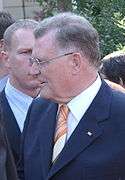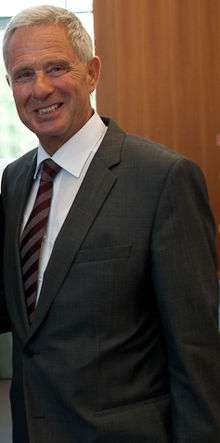1992 Baden-Württemberg state election
The 1992 Baden-Württemberg state election was held on 5 April 1992 to elect the members of the 10th Landtag of Baden-Württemberg. The incumbent Christian Democratic Union (CDU) government under Minister-President Erwin Teufel lost its majority. The CDU suffered a 9.4% swing, mostly to the national conservative Republicans, who achieved their best result in a state election, placing third with 10.9%. After the election, the CDU formed a grand coalition with the Social Democratic Party (SPD), and Teufel was re-elected as Minister-President.
| |||||||||||||||||||||||||||||||||||||||||||||||||||||||||||||||||
All 146 seats in the Landtag of Baden-Württemberg 74 seats needed for a majority | |||||||||||||||||||||||||||||||||||||||||||||||||||||||||||||||||
|---|---|---|---|---|---|---|---|---|---|---|---|---|---|---|---|---|---|---|---|---|---|---|---|---|---|---|---|---|---|---|---|---|---|---|---|---|---|---|---|---|---|---|---|---|---|---|---|---|---|---|---|---|---|---|---|---|---|---|---|---|---|---|---|---|---|
| Turnout | 4,949,199 (70.1%) | ||||||||||||||||||||||||||||||||||||||||||||||||||||||||||||||||
| |||||||||||||||||||||||||||||||||||||||||||||||||||||||||||||||||
| |||||||||||||||||||||||||||||||||||||||||||||||||||||||||||||||||
Parties
The table below lists parties represented in the previous Landtag of Baden-Württemberg.
| Name | Ideology | Leader(s) | 1988 result | |||
|---|---|---|---|---|---|---|
| Votes (%) | Seats | |||||
| CDU | Christian Democratic Union of Germany Christlich Demokratische Union Deutschlands |
Christian democracy | Erwin Teufel | 49.0% | 66 / 125 | |
| SPD | Social Democratic Party of Germany Sozialdemokratische Partei Deutschlands |
Social democracy | Dieter Spöri | 32.0% | 42 / 125 | |
| Grüne | The Greens Die Grünen |
Green politics | 7.9% | 10 / 125 | ||
| FDP | Free Democratic Party Freie Demokratische Partei |
Classical liberalism | 5.9% | 7 / 125 | ||
Results
Summary of the 5 April 1992 election results for the Landtag of Baden-Württemberg
| Party | Votes | % | +/- | Seats | +/- | Seats % | |
|---|---|---|---|---|---|---|---|
| Christian Democratic Union (CDU) | 1,960,016 | 39.6 | 64 | 43.8 | |||
| Social Democratic Party (SPD) | 1,454,477 | 29.4 | 46 | 31.5 | |||
| The Republicans (REP) | 539,014 | 10.9 | 15 | 10.3 | |||
| The Greens (Grüne) | 467,781 | 9.5 | 13 | 8.9 | |||
| Free Democratic Party (FDP) | 291,199 | 5.9 | 8 | 5.5 | |||
| Ecological Democratic Party (ÖDP) | 93,604 | 1.9 | 0 | ±0 | 0 | ||
| National Democratic Party (NPD) | 44,416 | 0.9 | 0 | ±0 | 0 | ||
| Others | 64,247 | 2.0 | 0 | ±0 | 0 | ||
| Total | 4,949,199 | 100.0 | 146 | ||||
| Voter turnout | 70.1 | ||||||
Sources
gollark: Sure.
gollark: Er... sure, but I'm going to bed soon and so will be unable to stop it until morning.
gollark: I require it, on pain of having demons rend apart the underpinnings of the universe to force you to pay for your crimes.
gollark: I mean, if they're just idling on discord, then presumably they can at least take the time to say "took this".
gollark: Probably not.
This article is issued from Wikipedia. The text is licensed under Creative Commons - Attribution - Sharealike. Additional terms may apply for the media files.

